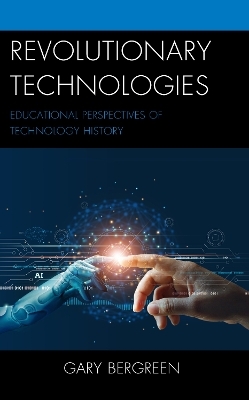
Revolutionary Technologies
Rowman & Littlefield (Verlag)
978-1-4758-7065-7 (ISBN)
Integrating technological innovations into our daily lives has helped to modernize and improve the way we learn, the way we do business, the way we communicate with one another, and ultimately the way we live. But in these modern times, which some refer to as the “Electronic Gadgets and App Age,” it has become difficult to know everything about the old and new electronic devices that continue to make the wheels of industry turn in society. New innovations appear and then just as quickly become antiquated and obsolete; technological advances from the past blend with the present and then, like ripples in a lake, fade in this fast-paced world.
How can anyone hope to keep up with those changes? The breadth of knowledge required is dauting, but technology impacts the choices we make, for better or worse. Revolutionary Technologies: Educational Perspectives of Technology History covers what has been invented, who invented what, and how technology has made our lives more efficient, enjoyable, and meaningful.
Gary Bergreen, a resident of Corona, California, has taught at the secondary school level for thirty years. He has also taught computer courses at Riverside City College and Chaffey College for the past twenty years.
Preface
Introduction
Chapter 1. The Compass: Zeng He
Chapter 2. The Printing Press: Johannes Gutenberg
Chapter 3. The Pascaline: Blaise Pascal
Chapter 4. Voice Recognition: Wolfgang Franciscus de Paula Johannes Elemosinarius von Kempelen
Chapter 5. Camera Technology: Joseph Nicéphore Niépce
Chapter 6. The Facsimile Machine and More: Alexander Bain
Chapter 7. Telephone to Smartphone: Alexander Graham Bell
Chapter 8. The Flying Man - Gliders: Karl Wilhelm Otto Lilienthal
Chapter 9. Radio (Remote) Control: Leonardo Torres y Quevedo
Chapter 10. The Father of Radio: Guglielmo Giovanni Maria Marconi
Chapter 11. Enigma Machine: Arthur Scherbius
Chapter 12. Headphones: Nathaniel Baldwin
Chapter 13. Madame X: Cryptanalyst: Agnes May Meyer Driscoll
Chapter 14. Sun Queen: Mária Telkes
Chapter 15. Grandma Cobol: Grace Brewster Murray Hopper
Chapter 16. Code Breaker: Alan Mathison Turing
Chapter 17. Spread Spectrum Wireless Communications System: Hedy Lamarr
Chapter 18. The Taser: John Higson Cover Jr.
Chapter 19.RFID Technology - Computer Chips in People: Charles Walton
Chapter 20.Barcode Technology: Norman Joseph Woodland
Chapter 21. Home Security: Marie Van Brittan Brown
Chapter 22. Kevlar - Heat-Resistant and Strong Synthetic Fiber: Stephanie Louise Kwolek
Chapter 23. Founding Father of Artificial Intelligence: John McCarthy
Chapter 24. Father of the Cellphone: Martin “Marty” Cooper
Chapter 25. Drone Daddy: Abraham Karem
Chapter 26. ARPANET: Robert Elliot Kahn
Chapter 27. Caller ID: Dr. Shirley Ann Jackson
Chapter 28. Project Gutenberg – eBooks: Michael Stern Hart
Chapter 29. OLED Screen Technology: Dr. Ching Wan Tang
Chapter 30. Robot Dogs: Marc Raibert
Chapter 31. 3D Printer Revolution: Adrian Bowyer
Chapter 32. Software Developer: William Henry Gates III
Chapter 33. The Father of Robotics: Joseph Frederick. Engelberger
Chapter 34. Microchip: Jack St. Clair Kilby
Chapter 35. Virtual Reality: Jaron Zepel Lanier
Chapter 36. Affective and Wearable Computing: Rosalind Wright Picard
Chapter 37. Father of Wearable Computing: William Stephen George Mann
Chapter 38. Story of Bluetooth: Jacobus “Jaap” Cornelis Haartsen
Chapter 39. Founder of Wikileaks: Julian Paul Assange (Hawkins)
Chapter 40. Bitcoin Mystery Person: Satoshi Nakamoto
Chapter 41. Biosuits: Dr. Dava Newman
Chapter 42. Body Camera: Devon and Cornwall Police
Chapter 43. Artificial Intelligence - Generated Voices: Zeena Qureshi
References
| Erscheinungsdatum | 21.01.2023 |
|---|---|
| Verlagsort | Lanham, MD |
| Sprache | englisch |
| Maße | 151 x 230 mm |
| Gewicht | 304 g |
| Themenwelt | Schulbuch / Wörterbuch ► Unterrichtsvorbereitung ► Unterrichts-Handreichungen |
| Geschichte ► Teilgebiete der Geschichte ► Technikgeschichte | |
| Sozialwissenschaften ► Pädagogik | |
| ISBN-10 | 1-4758-7065-5 / 1475870655 |
| ISBN-13 | 978-1-4758-7065-7 / 9781475870657 |
| Zustand | Neuware |
| Informationen gemäß Produktsicherheitsverordnung (GPSR) | |
| Haben Sie eine Frage zum Produkt? |
aus dem Bereich


